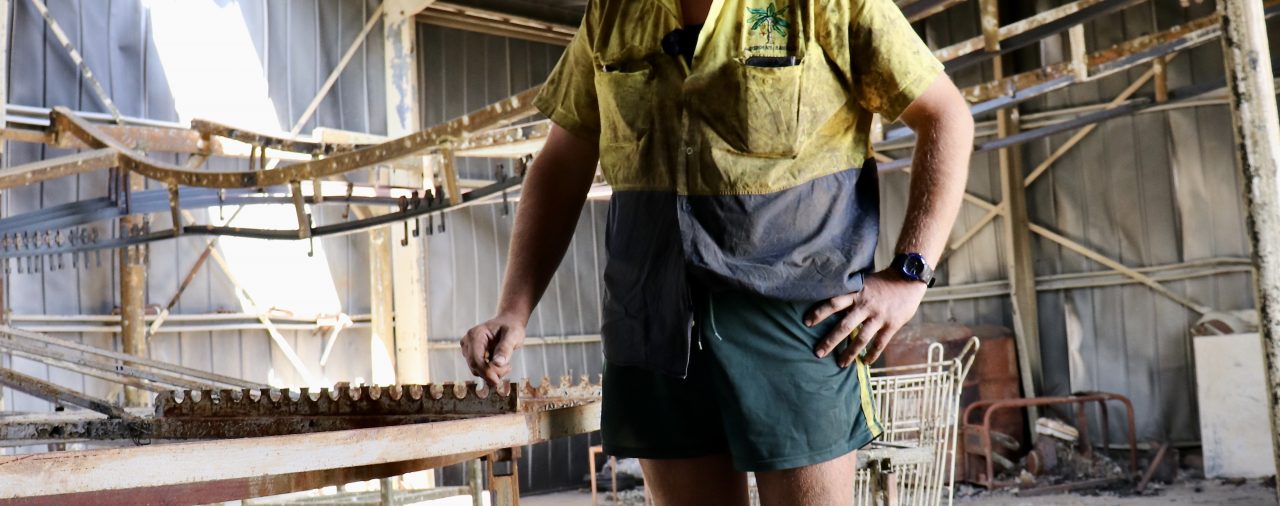
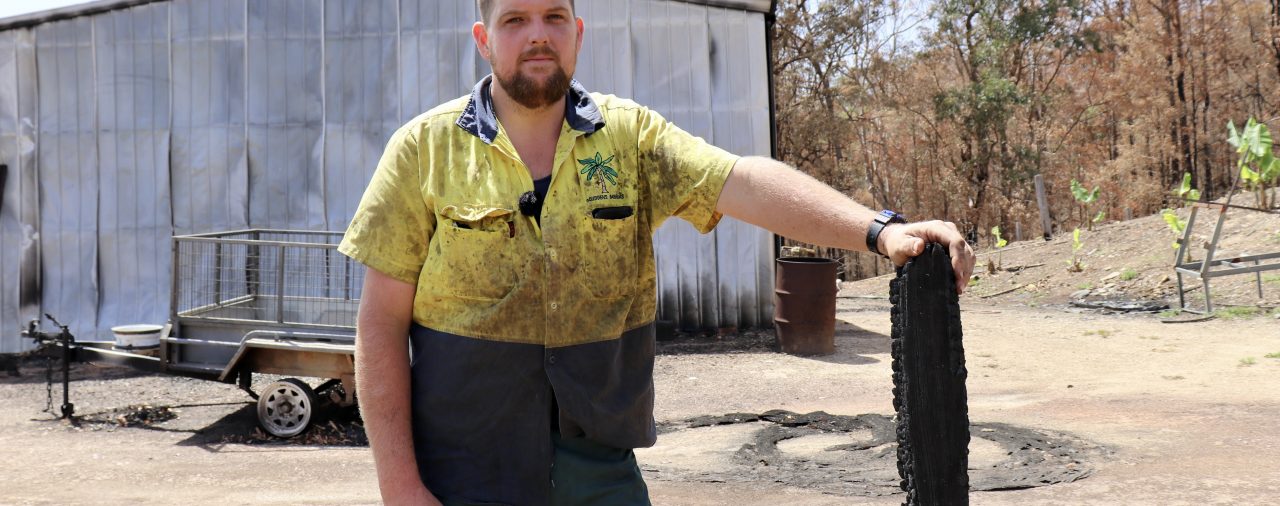
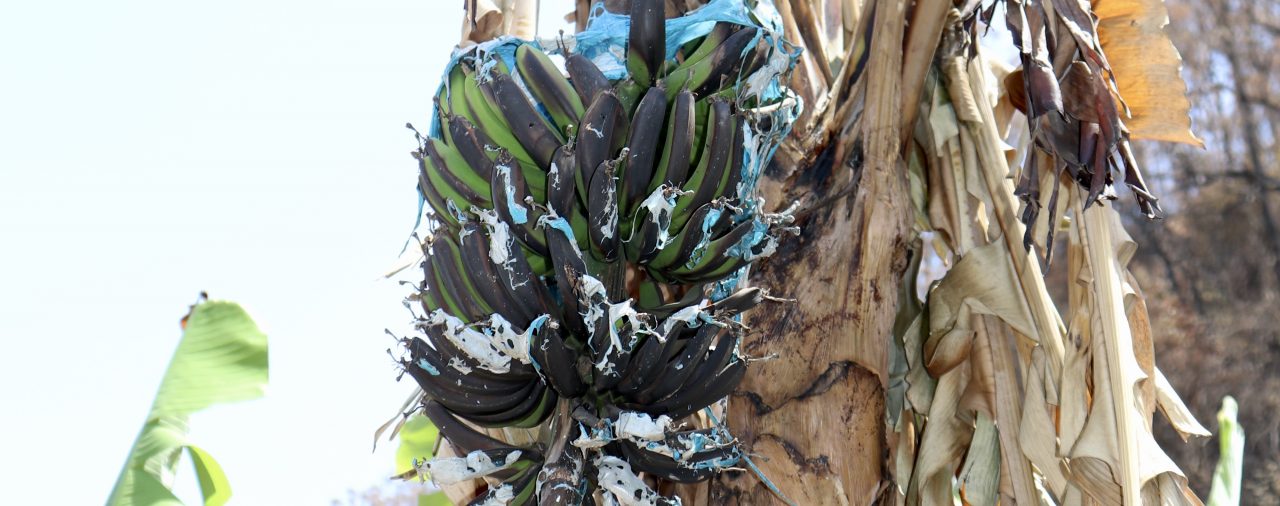
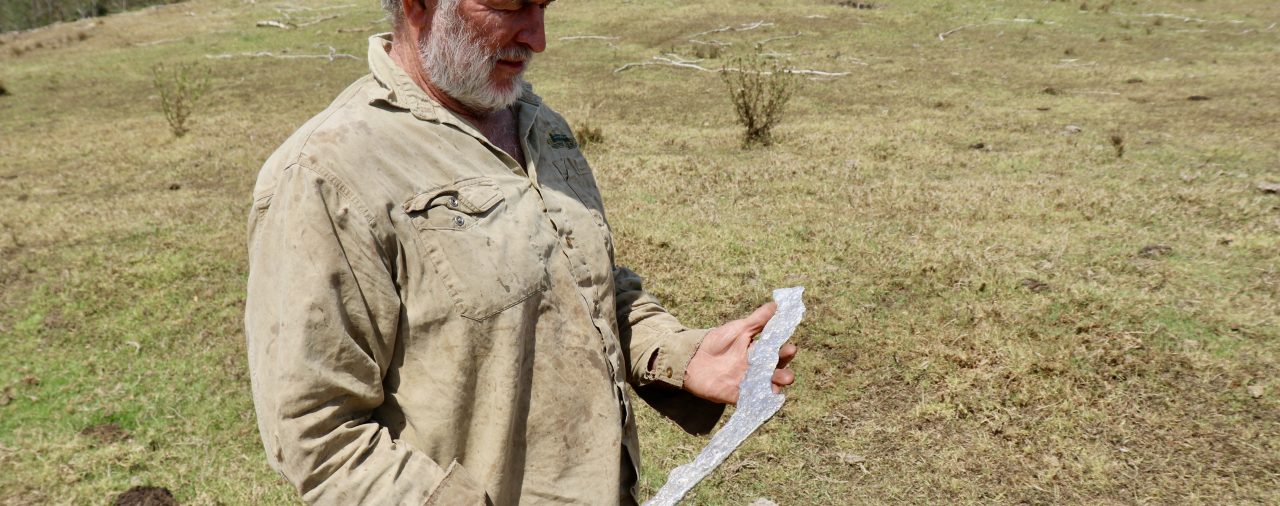
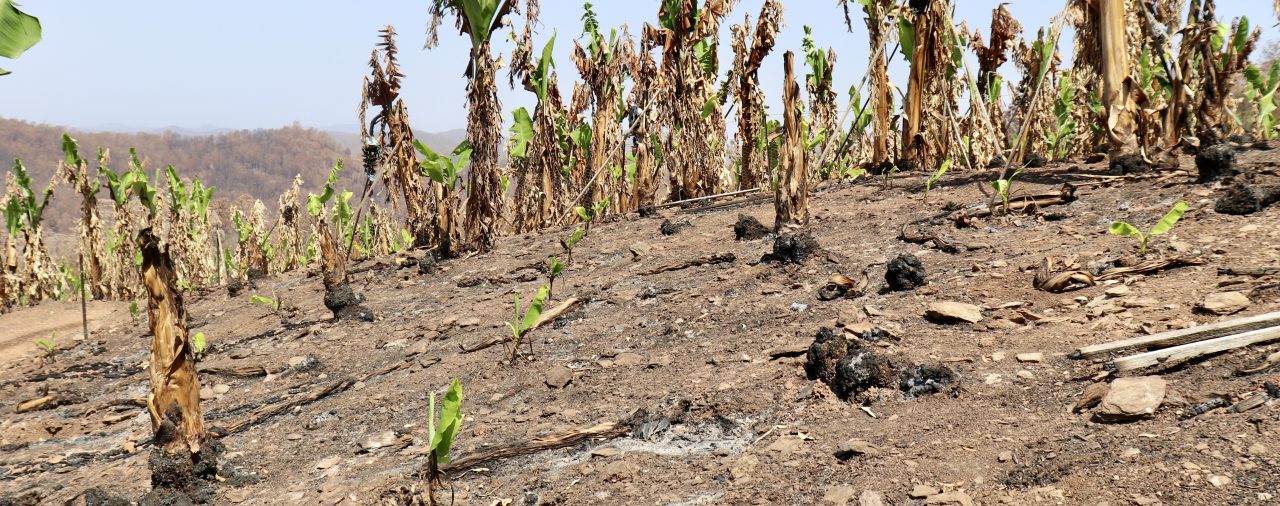
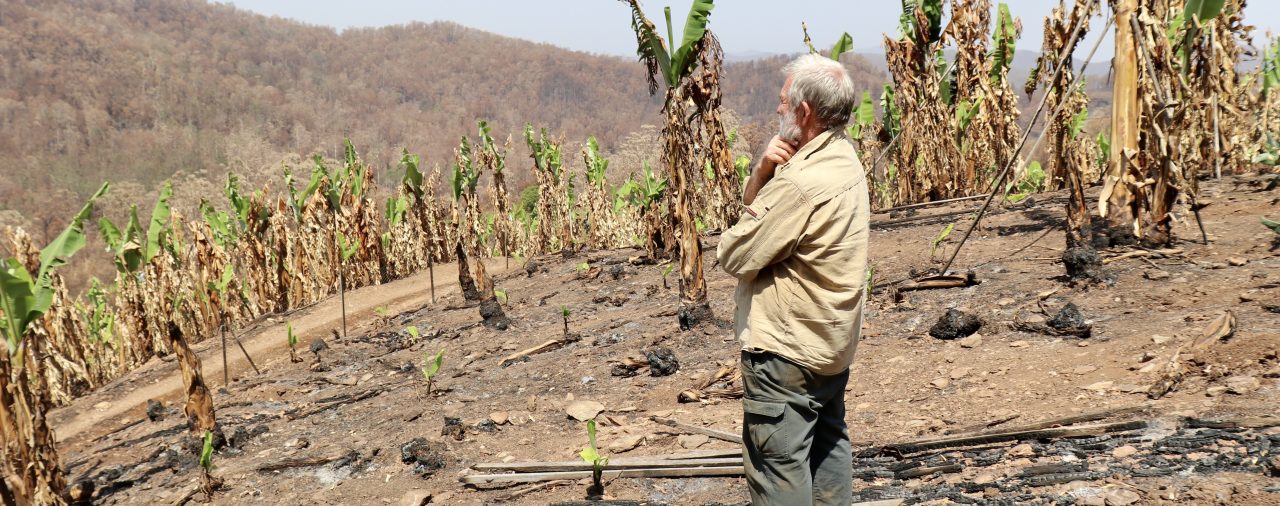
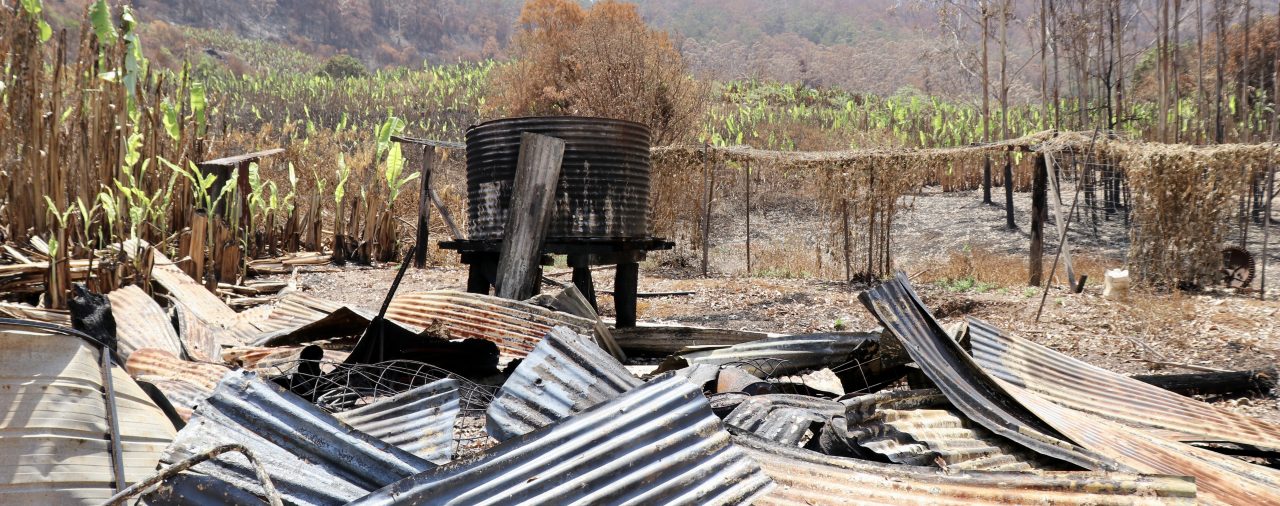

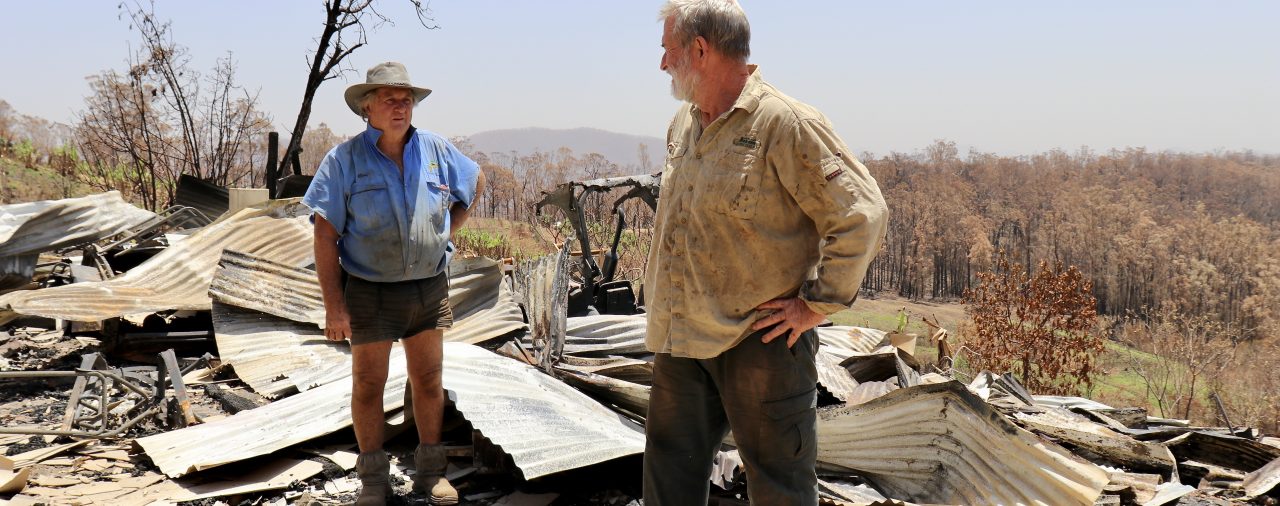
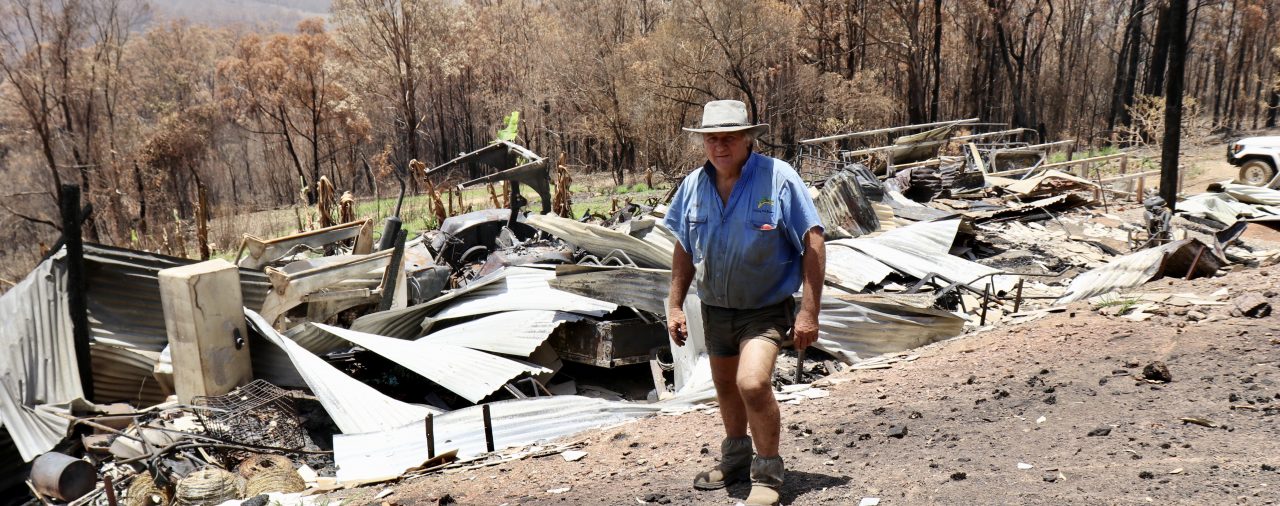
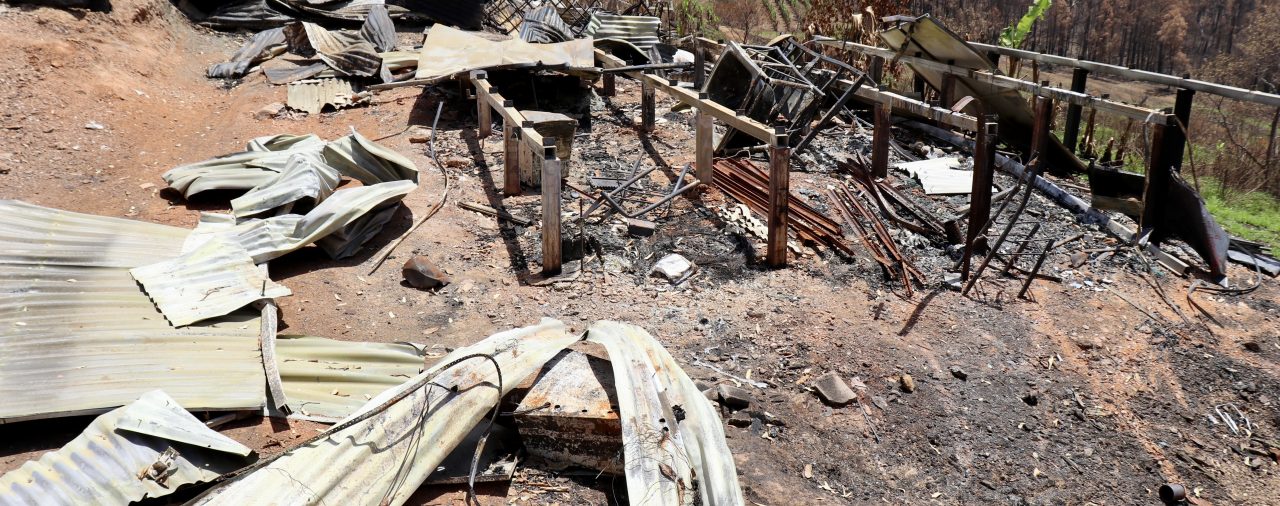
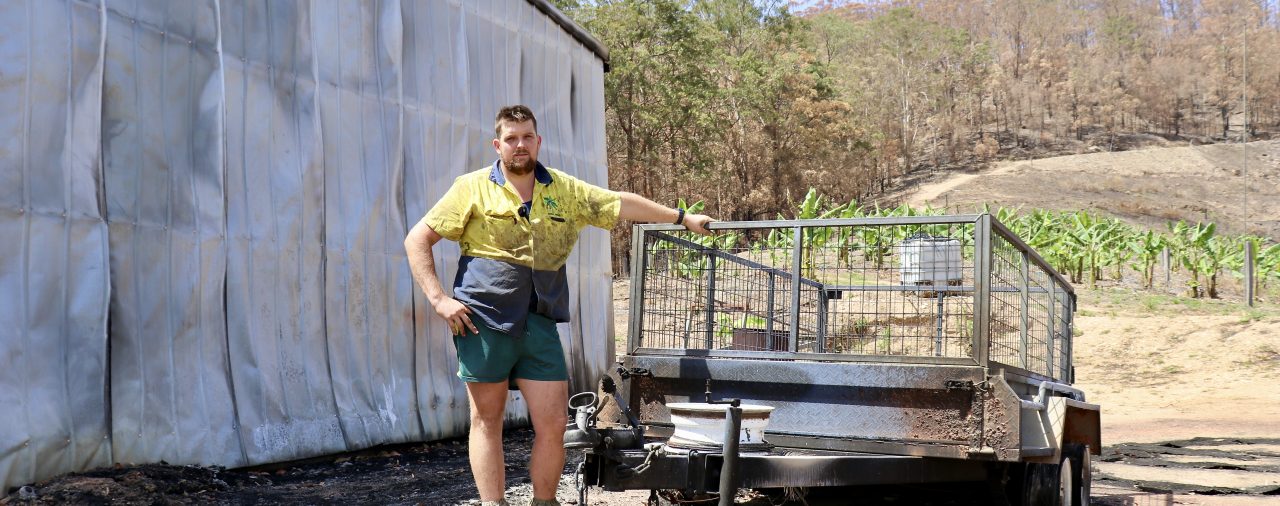
By Sonia Campbell
Four banana growers on the mid-North Coast of NSW and a fifth in central Queensland are continuing to recover after suffering severe losses from catastrophic bushfires, which swept through both states in November.
For some, returning to full production could take up to 18 months, after entire plantations were decimated in the destructive blazes, described in NSW as the worst in living memory.
The road to recovery, both financially and emotionally, will be a long one for those affected, but all are determined to bounce back.
Down but not out
Spear brothers determined to return to production.
Stephen and Michael Spear, Taylors Arm, NSW
Michael Spear will never forget the deafening “roar” he heard as fire engulfed his family’s beloved Taylors Arm farm, leaving him just minutes to escape alive.
“Earlier in the afternoon I’d still been packing fruit in the packing shed here, because I could see the fire break behind us was still holding it (the blaze), but later everything just turned feral,” he recounted.
“We heard this roar over the mountain in McHughs Creek and watched as the back of the mountain in front of us lit up and it was time to run. It was a very scary situation and we did basically run for our lives at the time.
“We only had one or two minutes to gather a couple of the most essential things that matter out of the shed. But you’re so confused and panicky at the time that, you know, I forgot my cane knives, and they’re very hard to come by these days.”
[abgc_video url=”https://www.youtube.com/watch?v=2Arc9g4R4R8&feature=emb_title”]
Michael and his brother Stephen have been growing bananas on their family-owned property for almost 40 years. In a matter of minutes, the catastrophic November bushfires destroyed their life’s work. Their entire farming operation – including 20 acres of Cavendish bananas, packing sheds and all other production equipment – were completely ravaged by the intense blaze.
Stephen – a Director of the Australian Banana Growers’ Council, who was away on business when the fire took hold – said the total financial loss the family had suffered in the once-in-a-lifetime blaze was something he “refused” to calculate.
“I’ve refused to even think about that,” he said.
“I had a tonne of fertiliser in my shed that just got burnt up. I would probably have had 8000 or 9000 (bunch cover) bags, in both those sheds there and they’ve all disappeared. When you consider they’re $1 each today … it’s a fairly big impost to take as well.
“(But) really the biggest loss has been our props. I worked out that I originally bought more than 10,000 props. I know when we first bought those we paid about 80 cents (each) for them. We put wire on the end of them to make them hold the bunch up as well. So … including labour … you wouldn’t get those props today for under $10 (each).”
Michael agreed that the props were a significant loss.
“We can’t really grow bananas without the props and 80 to 90 per cent of those are gone. Every bunch cover we had is gone. There were two quite substantial packing sheds here. We were under insured on the sheds. We might be lucky to get one decent shed back between us.”
Stephen, who also lost 120 avocado trees in the blaze, said the experience had naturally taken an emotional toll.
“I was here two days after the fire. I walked down and you could just look through and see the roofing all on the ground. Mick had already been up to see it and said, “Everything is gone. It’s all disappeared.”
“You stand in front of the dam and look up at both Mick’s and my (plantations) and yeah it’s pretty hard to take. I had avocados in the bananas as well and to see them now just breaks your heart a fair bit.”
Both Michael and Stephen said they were determined to return to production, with their banana trees already showing signs of recovery.
However, weather would play a crucial role.
“Unfortunately we don’t know when we’re going to be back (into production), because the bananas can’t respond until there’s rain,” Michael said.
Stephen added, “Two days after the fire, Monday morning, you could see the new shoots coming through on the bananas so I knew the bananas were going to be ok.”
“But we’ve had less than 20 inches of rain so far this year and the long range forecast says we won’t get much rain again until February next year, so we’re going to have an extremely short growing season.
But we sort of estimate it will be 12 months before we start cutting fruit again.”
While trying to remain positive, the Spear brothers both have strong reservations about the management of surrounding government-owned land.
“The lightening strike that started the fire in the bush behind us, the fuel levels were so high there, it was bound to happen,” Michael said. “The land (where the fire started) is located on the forestry boundary and national parks behind them, and there has been no hazard reduction in 40 years.”
“When we were kids the banana growers would light up right along the top (of the ridges) to make it safe in summer, but that sort of thing is just discouraged these days, it’s very risk adverse culture. Hazard reduction has gone out of fashion these days and it’s got to come back into fashion.”
Stephen added: “I agree with Mick. Something has to be done about how we look after our forests and bushland. I’d rather have 10 small fires than this great big one. It will take 50 to 100 years for the bushland to recover fully and that may not be enough.”
Everything gone
“Most of it I won’t be able to replace. Not in my lifetime anyway. It just costs too much money.”
David Cotton, Yarranbella, NSW
David Cotton was travelling to Newcastle when fire tore through his 53 acre Yarranbella farm, on Friday, November 8.
He returned three days later, to discover he’d lost everything.
“It was exactly as I expected,” he recounted. “I did have reports while I was in Newcastle of what had happened. I was told that it was a firestorm like you wouldn’t believe. I was a bit hopeful about my (new) tractor, but as you’ve seen, it went.
“(I lost) everything. All the equipment. Everything associated with growing bananas has been burnt.
“The bananas themselves (6 acres) they will come back. It will probably take 12-18 months for the bananas. But I’m not very hopeful about my avocados and fruit trees that I had, they don’t look very good to me at all. I probably will replant and just take it from there.”
Mr Cotton has been farming bananas on the property for the past 31 years. In all that time, he’s never witnessed such devastation.
“Worst (bushfire) I’ve ever seen anywhere. On the Thursday afternoon my brother and myself went down along Kosekai Road to have a look at it, and it was going north, away from us on another opposite ridge. Apparently, Friday afternoon a strong wind came up and sent it back this way.”
Sifting through rubble that used to be his shed, Mr Cotton estimated his losses at more than $250,000.
“When you take everything into account, loss of income from it (and all damage) I would estimate from $250,000 to $300,000.
“Most of it I won’t be able to replace, not in my lifetime anyway, it just costs too much money.
“I’ll have to have some sort of a shed, but it won’t be anything like the one I had, that’s for sure.”
Despite the circumstances, Mr Cotton remained positive about the future; however he said he was not expecting to receive any recovery support from government.
“I don’t expect too much from anyone. The government’s giving out grants, but the process is so complicated I don’t expect to get anything out of that. I’d be very surprised if we do.”
Grower starting out, faced with starting over
Clinton Welsh, Talarm, NSW
Industry newcomer, Clinton Welsh, planted his first crop of bananas on his Talarm property in the Nambucca Valley in February of this year.
After losing almost everything on the farm in the November bushfires, the young grower was facing the heartbreaking reality of starting over again.
“I’ve lost the packing shed, I’ve lost my banana wheel, basically I’ve lost everything inside this shed to process the banana product – bags, spray tanks, chemicals, fertilisers, lime, you name it,” he said.
“I’ve also lost my trailer, I lost my fire fighter (equipment), I’ve probably lost 50 per cent of my irrigation, but I’ve managed to salvage bits (of irrigation) by cutting off the burnt bits and re-joining all the good bits.
“So all told, I’ve just basically got to start again.”
Mr Welsh is a third generation banana grower. The farm where he has Ducasse bananas planted, has been in his family for more than 100 years.
“My grandfather first planted bananas in 1972 and my father took them on until the early 2000s, and I restarted them in February 2019.
“I’ve always wanted to grow bananas. I’ve always had a passion for bananas.
“I’ve always wanted to be part of the farm. But because of financial constraints in the industry – it can’t support families any more – you’ve got to go off farm. So, I was essentially guided to go away and (encouraged to) get a trade. And, I was probably just a bit too young all those years ago to deal with bananas, when dad got out of them.”
Mr Welsh said his introduction to bananas had been a “pretty tough start”, involving a lot of hard work, many trials and tribulations, and was all done out of his own “back pocket”.
“And now, to have this happen, it puts you back to square one I suppose. The whole exercise has been absolutely mentally draining, because there has always been set backs.”
He wasn’t at the farm when the fire storm ripped through, but was counting the costs and surveying the damage soon after.
“I saw it (the fire) ignite out the back and I thought … there’s nothing to worry about, because the fire fighters and everyone else had done a good job in containing it.
“And then by 3 o’clock you could just tell something wasn’t right. The weather wasn’t right. It was windy high in the trees, but it was dead still on the ground.
“I had to pick my daughter up. So I felt it best to first go over to the home farm and get dad, but he was in the paddock so I thought, well everything has to be alright, if he’s out in the paddock. He’s not worried about it.
“I rang dad at 6 o’clock and said “How’s things going?” and he said, “It’s no good, you’d better get up here.” When I got up here, the fire front had gone through and we were just putting out spot fires”.
Mr Welsh said he was still dealing with the emotional side of losing everything he needed to continue farming, with none of his infrastructure, trailer or equipment insured.
“It’s fairly hard. I mean I haven’t processed it all yet because there’s no time, you just have to pick yourself up and get going.
“You know, you can’t prepare yourself for these sorts of events. You see it on TV over the years, people go through fire storms and you think ‘You poor buggers. You know, how can you pick yourself back up again?’ But I think it’s just in our DNA and we just do it.”
“Thankfully, I had the irrigation going on the bananas (when the fire went through) so that sort of gave me a bit of hope that things were going to be ok.
“I’m not sure about the bananas yet. I think the parent plant will be ok. I am worried about what sort of bunch that they’ll form, because of the stress. But, I believe that they’re young enough to grow out of that. It’s the followers with the parent plant that I’m a bit worried about. I think I may have lost 50 per cent of them.
“I was looking at my first block bunching at about Easter next year, but we’re now probably looking at winter. And, as far as a second following goes, I’m not really sure.”
Appeal to support banana growers affected by bushfires
If you’d like to help out the growers affected by the East Coast bushfires, a special Go Fund Me campaign has been established to raise much needed financial assistance.
Growers are unable to insure crops and most of those affected have little to no insurance cover on farming infrastructure, machinery and other farming equipment.
Industry representatives are working with growers to access any government assistance available, however differing personal circumstances means this might not always be an option.
The ‘Banana Growers’ Bushfire Appeal’ Go Fund Me campaign is being run by Vicki McCudden, Chair of the Nambucca Banana Growers’ Association. It has the support of the Nambucca and Cassowary Coast BGAs, as well as the Australian Banana Growers’ Council.
All money raised will go directly to bushfire affected banana growers.

